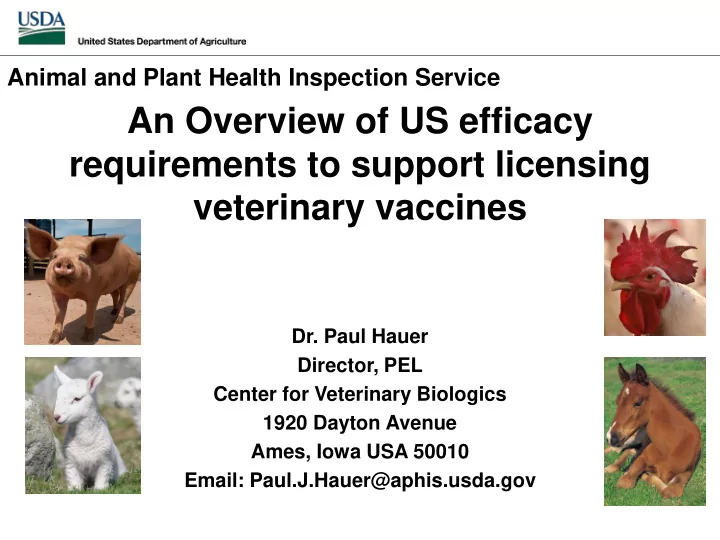

Animal and Plant Health Inspection Service An Overview of US efficacy requirements to support licensing veterinary vaccines Dr. Paul Hauer Director, PEL Center for Veterinary Biologics 1920 Dayton Avenue Ames, Iowa USA 50010 Email: Paul.J.Hauer@aphis.usda.gov
Efficacy guidance found in Veterinary Services Memorandum 800.202 Design . The preferred design for animal vaccine efficacy studies is the prospective, placebo- controlled, randomized, and double-blinded vaccination-challenge trial. In such studies, each subject receives the same exposure to the virulent pathogen by active challenge. By design, challenge studies aim to isolate the direct effect of the vaccine on individual subjects. Other types of studies, such as those relying on natural exposure, may be considered where warranted.
Many Efficacy Studies are Based on Historical Codified Standard Requirements • Many examples: Erysipelothrix rhusiopathiae , Pasteurella species for cattle and poultry, rabies, canine distemper, IBR, BVD, etc. • Challenge models proven; CVB may provide standardized challenge strains. • Some Standard Requirements scoring criteria are obsolete, but study designs may be similar. • Other non-codified but historically used challenge study designs are also utilized.
Differences to consider between EU and USA regarding veterinary vaccines • Historical data from vaccines licensed using standard requirement tests provide confidence. • Regulatory climate: Best vaccine is always the one that CVB will not or has not yet licensed. • Highly integrated livestock and poultry production companies decrease reliance on CVB to establish efficacy; speed is valued more. • Industry is pushing for new tools using latest technology; impetus for platform and prescription policies, conditional licenses, etc.
US reasoning supporting efficacy policy • Trade-off between natural exposure and close control of study design (equal exposure and minimization of confounding elements). • Less expense and fewer animals used. • Single tier labeling requires studies used in the licensing decision be posted on the web so there is transparency to customers. • Some segments of the livestock industry conduct their own efficacy trials to fine tune vaccine use to maximize benefits and minimize costs. • Field efficacy studies are allowed in US system, but adequate study designs are difficult to achieve.
Other Points for Consideration • Field safety is required by CVB for all products except autogenous vaccines and bacterins. • Client owned animals in clinical settings are used for studies involving newer immunotherapeutics (mainly cancer treatments). • CVB has extensive statistical support and includes a section with multiple PhD statisticians to assist with study design and data analysis of results. • Historical data regarding documented vaccine failures in the US are rare and do not support changes to require field efficacy data.
Questions?
Recommend
More recommend